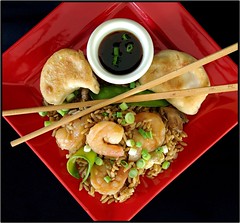Cooking Your Way to Vocabulary
Brendan O’Kane writes on Quora in answer to the question, “What should I do in order to improve my Chinese vocabulary?“:
[…] Cooking shows are an absolutely awesome resource for studying any language, because:They’re pretty focused in terms of spoken content. Sure, you get hosts who yammer on about how their grandmother used to make such-and-such a dish for holidays or whatever, but when you get right down to it, the core content — “this is a thing; this is how you make the thing” — is pretty predictable. Most of the discussion involves objects that are onscreen — usually being handled or pointed at — and actions that are being performed for you. If your hypothetical host says “把整头大蒜掰开,用刀切去根部的硬结,放入碗中倒入清水,” you don’t even have to know all of the words: he’ll be picking up the 大蒜 and 掰开’ing it right in front of you, then 切去’ing the 硬结 at the 根部 using his 刀, etc. At the end of it you’ll know how to cook a dish.
I like this idea, but I must admit I’ve never done it. There are a lot of highly-specific action verbs that might take years to master if you just learn them as you come across them, but cooking shows are one way to get exposed to a high number of them in a relatively short period of time.
Anyone out there tried this for Chinese? What are the good Chinese cooking shows?


Although it is not a cooking show, I recommend watching A Bite of China 舌尖上的中国. With 2 seasons of content, it is a healthy balance of food, culture, history, and geography all told from the human perspective.
I enjoy watching cooking shows in Chinese so I see where he is coming from. However, they always seem to lack the watchable charm that American cooking show hosts seem to always bring to the screen. Any suggestions on which cooking shows in Chinese are worth a watch? Also, do you know of any other good “lifestyle” shows in Chinese to watch (travel, cooking competition, etc.)? I saw a Vice show about Changsha nightlife and food that was all in Chinese with only Chinese subtitles and I really enjoyed that.
I remember reading the original post, and giving it a try. It’s very worthwhile, but no panacea. I used “Shíkè zhǔnbèi”《食客准备》. There are a lot of “moving, placing, mixing, doing” words that are natural for native speakers, but are hard to come by in context for learners that don’t have a Chinese spouse etc, and these are high frequency in these programs. I learnt Chinese for 5 years, before being confident of saying “pick up” “take” “move” etc correctly in a wide variety of situations. As a tangent, it blew me away the first time I heard 摘, I thought – how have I never heard this word? Even at chinesepod it only shows up after intermediate, but every 5 year old knows it. The other benefit of the cooking aspect for Chinese learners is how much “Chinese-ness” is wrapped up here. It is more than just food words, cooking words etc. There are other shows, as well, that provide a similar approach to learning – weather broadcasts are something else that comes to mind, but for slightly different reasons – it gives you a bunch of often repeated Chinese place names, along with clear visuals, and a lot general weather terminology ready made for small chat etc.
Try “MasterChef China” 《顶级厨师》. Maybe not as much vocabulary as a traditional cooking show, but definitely more entertaining. Identical to the American version. There are 2 seasons as of Nov 2014.
Why stop at cooking shows? This type of learning can be applied to all skills.